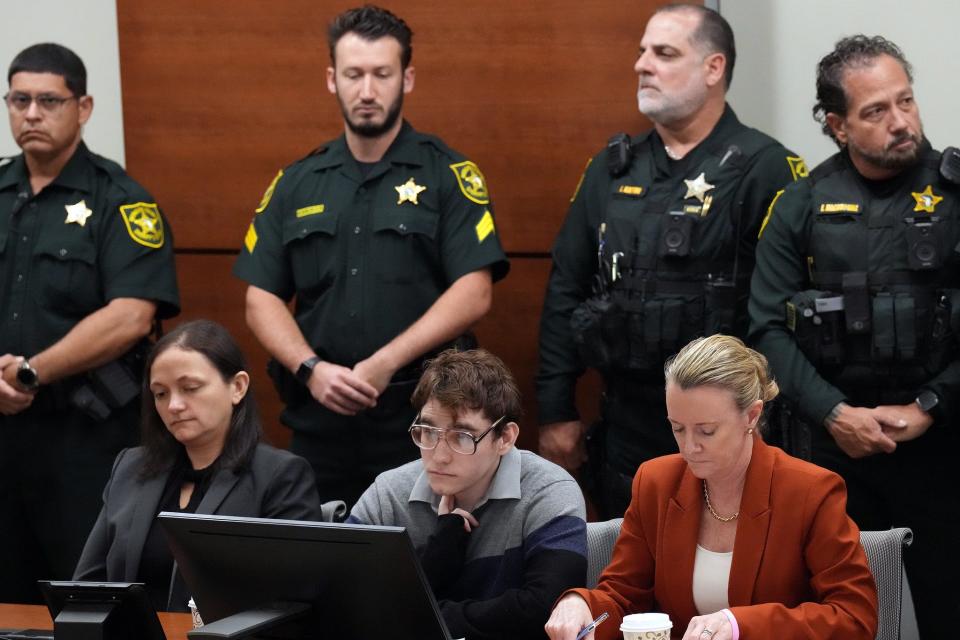Past time to end capital punishment: Sentencing process still isn't fair, fully transparent
As an advocate for sensible gun safety regulation, including a permanent ban on assault weapons, and as a loyal supporter of Moms Demand Action, I deeply empathize with the feelings of the families of the 17 people, including 14 children, brutally murdered by Nikolas Cruz at Parkland High School on Valentine’s Day, Feb. 14, 2018.
They understandably reacted with horror to the jury’s recent failure to impose the death penalty upon Cruz for his heinous crimes. According to news reports, the jury could not reach a unanimous decision that the aggravating factors in the case outweighed the mitigating factors, which included a form of mental illness.
If ever the death penalty should be imposed, it should be for such horrific crimes. Instead, Cruz received a life sentence with no possibility of parole. However, there are good reasons to end capital punishment entirely as we still have not found a way to make the sentencing process fair and fully transparent.

More from Robert Mounts:
Gainesville City Commission should rein in development, impose moratorium
Don't believe the "Big Lie." Local elections show the process should be trusted.
Downtown Gainesville needs to be clean, safe as part of improvement plan
I know of what I speak. While serving as assistant general counsel to former Florida Gov. Reubin Askew, I became the principal draftsman of Florida’s landmark 1972 capital punishment law and have followed its ups and downs over 50 years.
It was the first such statute enacted in America to restore the death penalty after capital punishment was struck down in Furman v. Georgia earlier that year.
It served as the model for the Georgia and Texas statutes that were upheld in 1976 by the U.S. Supreme Court in Gregg v. Georgia, Jurik v. Texas and Proffit v. Florida. A competing “mandatory death” scheme was struck down in Woodson v. North Carolina and Roberts v. Louisiana.
Gov. Askew signed the Florida law in private, against the desires of some on his staff, in large part because public opinion and two “blue ribbon” commissions overwhelmingly demanded it.
I have never been particularly proud of this legislative achievement and now believe our well-intended efforts in 1972 to achieve a transparent and equitable sentencing process have been a failure, due in part to subsequent decisions of the U.S. Supreme Court in Ring v. Arizona (2002) and Hurst v. Florida (2016) requiring that the sentencing decision be made by the jury, not in writing by a judge (as we intended), as well as the inherent fallibilities of our criminal justice system. Let me explain.
Our original purpose was to craft a fair, transparent process that would end discriminatory application based on race, and thus be found constitutional. We sought to accomplish this by requiring a written, reasoned opinion of the judge that could be reviewed on appeal, articulating clearly why aggravating factors proven by the evidence outweighed any mitigating factors.
At that time, most sentencing decisions were made by judges; the jury only had an advisory role. That changed when the U.S. Supreme Court held in Ring v. Arizona (2002) and Hurst v. Florida (2016) that this violated the convicted person’s Sixth Amendment right to a jury trial.

Prior to the Furman v. Georgia decision, most states operated under a system that permitted juries to spare a defendant’s life by recommending mercy, a decision that was made in secret. No one could tell why a given jury made this recommendation. The result was a high incidence of the death penalty being imposed on the poor, minorities and the socially less fortunate.
Our proposal, based upon the Model Penal Code and listing aggravating and mitigating factors, was thought more humane than the “mandatory” death statute proposed by then Attorney General Robert Shevin, which required imposition of the death penalty upon conviction of a capital crime, as a means of eliminating discretion.
We thought this would result in jury nullification as a jury could easily eliminate the possibility of the death penalty by finding the accused guilty of a lesser offense. Just as we cannot know why the Cruz jury deadlocked, we might never know why the death penalty was imposed or avoided.
Today, the evidence is overwhelming that the process is fraught with human error, unfair and extraordinarily expensive. The Innocence Project and DNA evidence have exonerated many on death row.
One need only read John Grisham’s 19th book, “The Innocent Man,” a nonfiction story, to see how flawed the process is. Although unlikely under a Republican administration, it should be scrapped altogether.
Robert Mounts, a retired attorney and former assistant general counsel to Florida Gov. Reubin Askew in 1972-74, lives in Gainesville.
Join the conversation
Letters to the editor present the opinions of readers on news stories and other pieces published by The Sun. Share your opinion by sending a letter to the editor (up to 200 words) to letters@gainesville.com. Letters must include the writer's full name and city of residence. Additional guidelines for submitting letters and longer guest columns can be found at bit.ly/sunopinionguidelines.
Journalism matters. Your support matters.
Get a digital subscription to the Gainesville Sun. Includes must-see content on Gainesville.com and Gatorsports.com, breaking news and updates on all your devices, and access to the eEdition. Visit www.gainesville.com/subscribenow to sign up.
This article originally appeared on The Gainesville Sun: Robert Mounts: Past time for America to end capital punishment:

